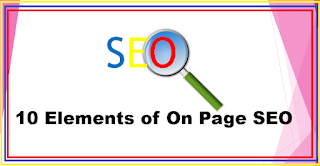Rintokusmiran.com |10 Elements of On Page SEO- If you put effort into on-page strategies, you’ll see a boost in traffic and a rise in your search presence. This guide will walk you through the most important elements of on-page SEO.
 |
| 10 Elements of On Page SEO |
1. E-A-T
E-A-T, which stands for Expertise, Authoritativeness, and Trustworthiness, is the framework that Google raters use to assess content creators, webpages, and websites as a whole.
Google has always put a premium on high-quality content. It wants to make sure that sites producing high-quality content are rewarded with better rankings and sites that create low-quality content get less visibility.
There is a clear relationship between what Google considers high-quality content and what appears in the search results.
Benchmark Your Google Search and Shopping Results
Compare your CPCs, CTRs & more with your industry. See how your CVR, AOV, bounce rate, and other KPIs stack up. Compare performance for each channel.
Call it correlation or causation – whatever it is, E-A-T is somehow playing a role in Google’s organic search results. Which means E-A-T must be a consideration in your SEO strategy.
2. Title Tag
The title tag, an HTML tag that exists in the head section of each webpage, provides an initial cue or context as to what the topical subject matter is of the respective page it is on.
It is featured prominently in the search engine results pages (typically used as the clickable link) as well as in the browser window.
The title tag by itself has little impact on organic rankings, this why it’s sometimes overlooked.
That said, missing, duplicate, and poorly written title tags can all negatively impact your SEO results, so make sure you’re optimizing for this element.
3. Meta Description
Since the early days of SEO, meta descriptions have been an important optimization point.
Meta descriptions, meta tags that provide a description of what the page is about, are often displayed in the SERPs underneath the title of the page.
While Google maintains that meta descriptions don’t help with rankings, there is anecdotal evidence that indirect attributes of better descriptions do help.
Optimizing meta description correctly can help improve:
Click-through rate (CTR).
Perception of the quality of the result.
Perception of what your website offers all change.
4. Headlines
Want your website content to perform well on search? Then start writing compelling headlines.
Coming up with a title for a blog post might seem too basic, but a great headline can mean the difference between a click and an impression – that’s why it’s important to create them strategically.
Your headlines need to spark interest for it to stand out on the SERPs – enticing users to click through and continue reading the rest of the content.
5. Header Tags
Header tags are HTML elements (H1-H6) used to identify headings and subheadings within your content from other types of text (e.g., paragraph text).
Header tags aren’t as critically important for your site rankings as they used to be, but these tags still serve an important function – for your users and your SEO.
They can indirectly impact your rankings by:
Making your content easier and more enjoyable for visitors to read.
Providing keyword-rich context about your content for the search engines.
6. SEO Writing
SEO writing means writing content with both search engines and users in mind.
There is a strategy behind writing solid SEO content – and it is more than just keyword research and fill in the blanks.
Simply producing content for the sake of it won’t do. Remember that you’re writing content for people – therefore that content must be high-quality, substantial, and relevant.
7. Keyword Cannibalization
True or false? The more pages you have targeting a keyword, the better you’ll rank for that keyword.
Targeting a specific term across multiple pages can cause “keyword cannibalization” which has some potentially disastrous consequences for your SEO.
When you have multiple pages ranking for the same keyword, you’re actually competing with yourself.
It’s important to identify whether keyword cannibalization exists on your website and resolve it right away.
8. Content Audit
Most content creators are focused on creating new content that they forget to audit their existing content. And this is a mistake.
Auditing your existing content is crucial because it helps you:
Evaluate whether your existing content is achieving its goals and gaining ROI.
Identify whether the information in your content is still accurate or has become stale (or even outdated).
Determine what types of content are working for you. Content audits can greatly help your SEO strategy and they should be done on a regular basis.
9. Image Optimization
Adding images is a good way to make your webpages more appealing. But not all images are created equal – some can even slow down your website.
Optimizing images properly will help you make the most of a valuable SEO asset. Image optimization has many advantages, such as:
Additional ranking opportunities (show up on Google Image Search).
Better user experience.
Faster page load times.
Images shouldn’t be an afterthought. Make sure to incorporate images that support your content and use descriptive titles and alt text.
10. User Engagement
Enhancing your website’s on-page SEO elements is only half the battle.
The other half lies in making sure that users will not bounce – but instead, they’ll continue viewing your content, interacting with it, and keep coming back for more.
Retaining engaged users is a great challenge in itself, but it’s certainly doable. To increase user engagement, focus on aspects such as site speed, user experience, and content optimization, among others.

1 comment:
youtube :: youtube :: youtube_com:videogame_video_video
youtube :: youtube_com:videogame_video_video_video_video. I youtube downloader was thinking about adding videos in youtube channel "live tv" youtube,
Post a Comment